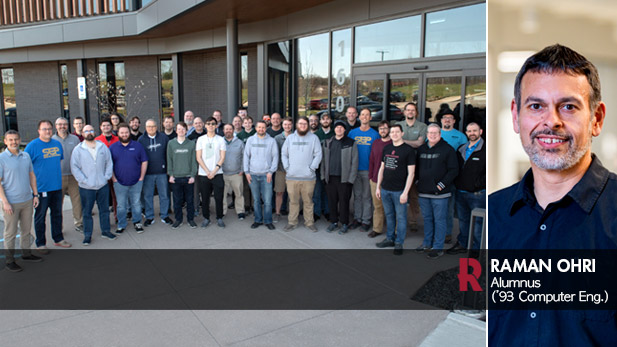Alumni Keeping SEP on Leading Edge of Tech Innovations, Workplace Culture

Innovative SEP software development company was founded by four Rose-Hulman alumni and today 54 graduates of the top-ranked STEM college are contributing to the firm’s success, including President/CEO Raman Ohri.
Three decades after its founding by four Rose-Hulman alumni, central Indiana’s SEP software product design and development firm continues to earn recognition for core principles deeply rooted in the values of the Institute. After all, there are 54 graduates among its 171 employees, including several in key leadership roles.
SEP was named TechPoint’s Exceptional Employer of the Year at the 26th annual Mira Awards in Indianapolis, ranked the No. 1 Top Workplace by the Indianapolis Star, and recently recognized as a Top Midsize Employer among the 2025 Best Places to Work in Indiana, an Indiana Chamber of Commerce initiative. These accolades celebrated the employee-owned company for developing and enriching skills-based STEM talent, cultivating a strong workplace culture, and impacting the community in positive ways.
Along the way, SEP has provided powerful teams of thoughtful, full-stack developers, and designers that bring ideas to life and are up to nearly every challenge that’s put before them.
That was the guiding principles of SEP’s co-founders Jeff Gilbert, a 1985 mechanical engineering alum; Anthony (Tony) Montgomery and Tim Shoemaker, 1986 computer science graduates; and Mike A. Fouch, a 1986 electrical engineering alum.
Today, the Carmel-based company is being led by President and Chief Executive Officer Raman Ohri, a 1993 computer engineering alum. Other alumni in key roles include Vice President of Service Delivery Ryan Schade, a 1999 computer engineering alum; Director of Software Engineering Jon Fuller, a 2004 computer engineering graduate; Director of Security and Operations Paul Pringle, 1986 computer science alum; Director of Talent Acquisition and Onboarding Kyle Pinches, a 1999 computer engineering graduate.
Other alumni are in a variety of lead roles in software development, client engagement, and project testing and quality control–making SEP one of the midsize companies with the largest employee pools of Rose-Hulman graduates, with possibly more on the way.
“Rose-Hulman graduates continue to have strong technical skills, problem-solving skills, and hands-on experience, all of which are needed at SEP,” said Pinches. “Rose-Hulman focuses a lot on collaborative and project-based learning that mirrors our team culture here at SEP. Not all schools foster that. This lets new hires from Rose-Hulman integrate quickly with our existing teams. And Rose has always felt quite welcoming to have us on campus, whether for career fairs, information sessions, or class talks.”
A few of the principles that any Rose grad would find as familiar threads if they examined SEP are:
- A focus on really understanding a client’s world and solving the key problems (not just the initial ask)
- An environment where people can do their best work–supported, always learning, and with peers that make them better
- Instilling confidence to tackle any technical challenge
- A relentless desire to improve in every aspect of the team’s work and the company
SEP’s many successes come from a focus on the talent of its teams and the company leaders’ commitment toward continuous improvement. The company has a 95% employee retention rate and team members are empowered to tell clients kind truths, even if it means sacrificing business. In 2020, SEP created The SEP Foundation to further its impact. Since then, the foundation has awarded STEM scholarships within the community and works closely with organizations dedicated to developing Indiana tech talent.
“Being a good part of the community—supporting our peers, supporting charitable causes in town—while also building a profitable business, pouring into our people, and knocking it out of the park for our customers does not have to be a zero-sum game,” Ohri admitted.
As for his own journey from Rose-Hulman to SEP, Ohri stated, “My educational experience at Rose has had a pervasive impact on my career. At the surface, I developed a sound set of engineering skills and knowledge that was essential to getting started as a professional software engineer. At a deeper level though, the curriculum taught me how to learn and that meta-skill has delivered a return every year of my career. Early on, it was learning how to do software engineering as a professional, understand our clients’ complex domains, and the processes by which we do work.”
He added, “As software has eaten the world, the tools, platforms, and paradigms have arrived at an ever-accelerating pace. It would be very, very difficult to be a professional in technology without the ability to constantly learn. My career path has evolved from individual contributor to team lead to leader of leaders, and now executive leadership; the learning has never stopped. It might be a leadership principle, a finance concept, interacting with municipal government, or a myriad of other things, but the ability to learn remains foundational. This is, of course, leaving out the non-classroom aspects–the confidence to tackle new things and the incredible Rose network.”